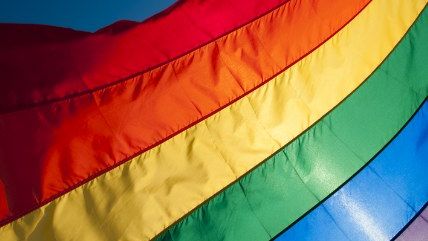In America, Muslims Are More Likely to Support Gay Marriage Than Evangelical Christians
Don't succumb to the fear that U.S. followers of Islam are time bombs waiting to explode.


It may be mystifying to conservatives and libertarians that a good chunk of angry response from the left over the Orlando shooting is directed toward conservatives, not just about gun control but over the way they've historically treated gays and lesbians.
It is most obviously true that even to the extent that Christian social conservatism has been hostile to acceptance of gays and lesbians, it has certainly not risen to the horrifying levels of Sunday's attack by Omar Matteen, which he dedicated to the Islamic State. Certainly there have been radical Christians within the United States calling for violence against homosexuals. But their calls to arms have been ignored and are not institutionalized by authorities (with prison terms and even executions) as they frequently are in Muslim-dominated countries.
There has nevertheless been plenty of generalizations about the attitudes of Muslims toward homosexuality that has led some on the right to wonder why people are yelling at them over what happened on Saturday. I agree with conservatives that trying to deflect away from what actually happened to hobby-horse issues like gun control is an awful thing to do.
But a couple of Pew polls might help explain what's going on here. It is true that there is a tremendous amount of hostility to gays and lesbians in countries where Islam is a dominant religion. A Pew poll from 2013 had the vast majority of Muslims in 36 countries overseas declaring that homosexuality is immoral. When I say "vast majority," I mean numbers like 90 percent.
But a recent poll in 2015, also by Pew, shows that American Muslims are much less likely to share this attitude. By comparison, 45 percent of American Muslims approve of homosexuality, and 42 percent of Muslims support same-sex marriage recognition. In both cases, a greater number disapprove of acceptance than approve. But then, so do Evangelical Christians in numbers greater than American Muslims. Only 36 percent of Evangelical Christians approve of homosexuality and only 28 percent of Evangelical Christians support same-sex marriage recognition.
The good news is that support for acceptance of gays and lesbians in America has increased in all faiths between 2007 and 2014. And the point of this post is not necessarily to hold up social conservatives to criticism over an incident they had nothing to do with.
Rather, these numbers help demonstrate why exactly we cannot treat American Muslims as though they're inherently suspicious and prone to jump into extremism and jihads. American Muslims are not necessarily more conservative than many of our country's Christians. There are a whole host of different reasons for this (including the likelihood that Muslims immigrate to the United States in the first place to get away from extreme social conservatism within their own religion). Americans (including gay Americans) who interact regularly with Muslim citizens are probably less likely to see them as being profoundly different. Because they're not—in the United States.
Add to this mix information that Mateen apparently declared allegiance to different Islamist groups who are opposed to ISIS, like Hezbollah. In the end, Mateen may be a vicious garden-variety psychopath that we're treating exotically because he declared a connection to a terrorist group that hates the United States and has called for attacks against it. But in reality he may well be more reminiscent of serial killer Ted Bundy blaming his behavior on porn addiction.
The Islamic State is a violent, terrorist group (I realize that's the mother of all "to be sure" caveats), but it's important not to treat it like it's a virus that people of Muslim faith can just catch. American Muslims don't share the attitudes of the Islamic State, and so treating them with skepticism, generalizing about them, and also expecting some sort of collective responsibility that all Muslims must be held accountable for the policing those who share the faith, doesn't seem any more helpful than more gun control regulations. It's fear-based collectivist attitudes from the right and it reads like so many other historical fears about how various minorities will drag America down. Such generalizations feed a culture war (just like the gun control arguments) rather than examining the roots and potential solutions for the problem.
(Hat tip to former Reason editor Matt Feeney.)


Show Comments (340)